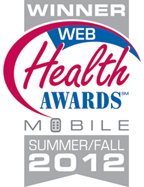|
Evaluating Online Exercise and Sports Nutrition Information
Author:
Stan Reents, PharmD
Original Posting:
05/25/2017 10:58 AM
Last Revision: 04/28/2019 06:40 AM
In 2017, “fake news” became a frequent topic. Thus, it's worthwhile to comment on the quality of exercise and sports nutrition information on the web. How can you identify high quality resources in these categories? How can you identify high quality resources in these categories?
THE INTERNET: BEWARE!
Everyone should know by now that information on the Internet ranges from “superb" and "accurate” to outright false. In fact, the news media has interviewed guys who admit that they intentionally post fake news. Those guys should be ashamed of themselves.
Here are 7 details to look for, and, how AthleteInMe.com® ranks in these criteria:
1) IS THE CONTENT SUPPORTED BY SOLID SCIENTIFIC RESEARCH?
One of the best indicators of quality health, exercise, and sports nutrition information is if the article or blog cites scientific research as the source of the facts and recommendations it provides. Honestly, in my opinion, it's the MOST important detail!
Health advice -- and that includes exercise advice and nutrition advice -- absolutely must be based on scientific research. For example, if a personal trainer tells you to start consuming protein supplements, there should be some clear justification for that. Was a dietary history done? Does your personal trainer's advice match what leading nutrition experts recommend?
• What about AthleteInMe.com®? This is where our content is head-and-shoulders above others. Our review “Dietary Protein and Exercise” cites 48 research publications. Our review “Exercise and Coronary Artery Disease” cites 88. Not all of our reviews in the Articles Library are like that, but when the topic involves a medical condition, the research and documentation for that review article is very extensive.
Sometimes, I make recommendations that deviate from what the medical profession says. Examples include:
WHAT THE MEDICAL
PROFESSION SAYS |
WHAT WE SAY |
| "Caffeine is dehydrating" |
Actually, caffeine is a very weak diuretic.
You can develop tolerance to it, and,
its diuretic actions are minimized when you exercise. |
"You should reduce your
salt / sodium intake" |
In fact, if you're perspiring,
you want to increase your salt intake! |
"Perform vigorous exercise
for 20 min/day,
3 times per week" |
New research is now revealing that
you can do even less
and reap the same health benefits! |
In discussions like these, I always cite the research studies that support my recommendations.
From time to time, I am contacted by other authors wishing to have their articles published on AthleteInMe.com®. So far, I have turned all of them down. I have yet to see anyone write "evidence-based" content at a consumer-friendly reading level that meets my high standards.
2) IS THE AUTHOR QUALIFIED TO WRITE ABOUT THE TOPIC?
You should also investigate if the author is qualified to write about the topic.
Somewhere on the article or blog page, there should be an "About The Author" summary. Review the author’s education, certifications, and career history. If that isn't provided, then locate the "About Us" discussion on that web site.
But, just because an author is a health care professional, that doesn’t make him/her an expert on everything related to human health. I am always annoyed when some chiropractors claim they can help with medical conditions unrelated to the back (ie., asthma, etc.); they’re not trained or qualified to manage some of the health conditions they claim they can. Likewise, you wouldn’t go to a dentist for treatment of diabetes or hypertension. Dentists are not trained or licensed to practice internal medicine so it's outside their scope of practice ethically and legally. In other words, a health care professional needs to have proper education, training, and certification in the topic they are providing advice on.
This brings up physicians: Indeed, physicians are very intelligent and highly knowledgeable. Certainly, they are qualified to comment on the treatment of disease. But, medical school and residency training provide very little formal education in either nutrition or exercise. A 2004 survey revealed that only one-third of US medical schools offered a formal course in nutrition (Adams KM, et al. 2006).
Regarding education on exercise, a separate survey of US medical schools in 2013 revealed that 82% did not require their medical students take a course on the health benefits of exercise. 51% didn't even offer any course like this! (Cardinal BJ, et al. 2015). Thus, it’s not really surprising why most physicians in primary care state they don’t feel competent in advising their patients how to exercise to maintain their health.

What about personal trainers? Empirically, it seems logical to conclude that a personal trainer would be your best source of exercise information. Maybe, but maybe not.
Researchers at UCLA reported that personal trainers who held a bachelor's degree in exercise science and a certification from a reputable organization such as the American College of Sports Medicine (ACSM) or the National Strength and Conditioning Association (NSCA) performed better on a knowledge exam compared to trainers who didn't have a similar educational background, even if they had spent more years working as a personal trainer (Malek MH, et al. 2002). Regarding nutrition knowledge, leading certification organizations such as ACSM and ACE caution personal trainers not to engage in making specific nutrition recommendations to manage medical conditions.
• What about AthleteInMe.com®? All of the Articles in the Library have been written by me. Am I qualified to write about the health benefits of exercise and nutrition? In addition to 10 years experience in adult internal medicine (3 of those in critical care), another 10 years as the Editor In Chief of a major drug information resource for health care professionals, and author of an academic textbook, I have obtained 5 exercise/fitness/coaching certifications. My bio can be viewed here: About Dr. Stan Reents.
3) DOES THE AUTHOR HAVE A CONFLICT-OF-INTEREST?
The author might be qualified to write about the topic, but if he/she has a conflict-of-interest, then, you should be skeptical of the advice provided. For example, if the author recommends a dietary supplement or a protein supplement, but receives money from the manufacturer of that product in any way, then, those recommendations have little credibility.
In January 2006, the Center for Science in the Public Interest (CSPI) published a report in their newsletter Nutrition Action, stating that Andrew Weil, MD, received revenues from the manufacturer of the dietary supplements he recommends. That is clearly a conflict-of-interest. More recently, Dr. Oz had to testify before Congress because of his too-frequent endorsements of dietary supplements. But even if he doesn't receive compensation for these recommendations, it would be misleading to viewers of that show if scientific research can't confirm his recommendations.
Unfortunately, conflicts-of-interest are going to be difficult for you to determine. In some of the leading medical journals, authors are required to report any potential conflicts-of-interest and these details are presented at the end of the research paper. That's a good thing, and this is appearing more often in research studies published in reputable medical journals. However, this level of transparency isn't available on most consumer health, exercise, and nutrition web sites.
• What about AthleteInMe.com®? We have no affiliation with any dietary supplement manufacturer. And, other than creatine or fish oil (which there is an abundance of clinical research on for both!), we never push dietary supplements.
We do promote exercise products in the FITNESS GEAR section of the web site. We also review books on exercise, training, and sports nutrition (see: Book Reviews). We rate some of these products. If we really like them, we'll give them 4 stars. For each product, we place a link to Amazon.com. If you navigate to Amazon by clicking on that link, and, then, purchase that item, we do receive a small commission on that sale. This is one of the ways we support AthleteInMe.com®, which is offered to everyone for free.
We don't see that as a big conflict-of-interest. That's different than a physician telling you to purchase a specific brand of dietary supplement from a manufacturer he/she has a financial relationship with. Physicians are regarded as "trained intermediaries", meaning that they possess specialized knowledge that the general public relies on.
4) IS THERE AN EDITORIAL REVIEW TEAM?
The Internet allows anyone anywhere to publish anything....instantaneously. Unfortunately, many people view authors as "experts." That's a risky assumption!
The Internet also makes it easy to completely ignore any editorial review. Even consumer publications need a strong content review process...especially if the content provides recommendations on how to improve your health. I doubt that most bloggers are even aware of the importance of this.
Rodale publishes a variety of health/fitness magazines. Even though these are consumer magazines, they have an impressive editorial review team. Take a look at any issue of Men’s Health, or Runner’s World. Years ago, I published a short article in Runner’s World: they made me re-write it countless times! Clearly, they are thorough!
• What about AthleteInMe.com®? AthleteInMe.com® utilizes an editorial review team, too. Mostly, these people are health care and business professionals. Going forward, I will add individuals with expertise in clinical nutrition and exercise physiology into the group.
5) IS THE WEB SITE CERTIFIED?
You may not be aware, but several organizations do evaluate and certify the quality of health information web sites. One is a Swiss group called “Health On The Net (HON) Foundation” (www.HON.ch). The other is the non-profit US group “Utilization Review Accreditation Commission” (URAC) (www.URAC.org).
HON has been evaluating health information web sites since 1997. And that has been their original mission. URAC, on the other hand, started out as an agency to ensure the quality of health care systems, then, later, began evaluating health information web sites.
Upon request, these groups will evaluate your web site. If it meets their criteria, they will allow you to place their logo on your home page. WebMD.com is an example of a consumer health information web site that has earned both of these certifications. Scroll down to the bottom of their home page and you'll see the logos for HON and URAC.
Note that both HON and URAC certify “health” information web sites. To my knowledge, there isn’t any organization that certifies the quality of exercise or sports nutrition information web sites. Years ago, I wrote to the American College of Sports Medicine (ACSM) and urged them to initiate this endeavor, but they never pursued it.
• What about AthleteInMe.com®? I have not (yet!) submitted it for certification. Stay tuned though!...
6) HAS THE WEB SITE WON ANY AWARDS?
Admittedly, winning an award is not as impressive as obtaining a formal certification from HON or URAC, but, it’s not “nothing” either. Groups like Digital Health Awards evaluate web sites and mobile apps, and WEGO Health Awards evaluates the people who produce them. These awards lie somewhere between the Nobel Prize – the pinnacle of scientific research – and popularity awards like those in the entertainment industry: Oscar, Grammy, etc. Obviously, that’s an incredibly wide spectrum. We like to think that Digital Health Awards and WEGO Health Awards are much closer to the Nobel Prize end than to the other one.
• What about AthleteInMe.com®? I’m happy to report that, all 3 times I submitted either AthleteInMe.com® or our Exercise Calorie Converter mobile app to Digital Health Awards, they have acknowledged the high quality of our exercise/nutrition resources!
7) ARE THERE ANY TESTIMONIALS?
Testimonials need to be viewed somewhat cautiously. The web-master has the ability to choose what to post and what to ignore.
Nevertheless, if there are quite a few good testimonials, this can provide some assurance that the author/publisher is on the right track.
• What about AthleteInMe.com®? We receive glowing testimonials from people all the time. You can see some of them here. Since we launched the web site in January 2005, we have received no more than maybe 2 or 3 negative comments.
Positive comments have come from physicians as well as consumers. One person who develops continuing medical education content for health care professionals wrote a very nice testimonial. A health care system in North Carolina included some of our content in a Patient Education Manual they were developing. We have also had academic institutions from as far away as Finland and South Africa ask for permission to include our Articles in their course syllabus.
IN CONCLUSION...
As someone who has developed a variety of health, exercise, and nutrition resources, I regard factual accuracy as the most important obligation. The Testimonials and Awards we have received attest to the fact that our content is extremely high quality.
Unfortunately, not all consumer exercise and sports nutrition online content is like that. Hopefully, by applying some of the criteria listed above, you can separate the good from the bad.
FOR MORE INFORMATION
The National Library of Medicine has produced a 16-minute tutorial explaining how to evaluate online health information: Evaluating Internet Health Information.
Readers might also be interested in these reviews:
EXPERT HEALTH and FITNESS COACHING
Stan Reents, PharmD, is available to speak on this and many other exercise-related topics. (Here is a downloadable recording of one of his Health Talks.) He also provides a one-on-one Health Coaching Service. Contact him through the Contact Us page.
REFERENCES
Adams KM, Lindell KC, Kohlmeier M, et al. Status of nutrition education in medical schools. Am J Clin Nutr 2006;83(suppl):941S-944S. Abstract
Cardinal BJ, Park EA, Kim MS, et al. If Exercise Is Medicine®, where is exercise in medicine? Review of US medical education curricula for physical activity-related content. J Physical Activity Health 2015;12:1336-1343. Abstract
Malek MH, Nalbone DP, Berger DE, et al. Importance of health science education for personal fitness trainers. J Strength Cond Res 2002;16:19-24. Abstract
Stoutenberg M, Stasi S, Stamatakis E, et al. Physical activity training in US medical schools: preparing future physicians to engage in primary prevention. Physician Sportsmed 2015;43:388-394. Abstract
ABOUT THE AUTHOR

Stan Reents, PharmD, is a former healthcare professional. He is a member of the American College of Lifestyle Medicine (ACLM) and a member of the American College of Sports Medicine (ACSM). In the past, he has been certified as a Health Fitness Specialist by ACSM, as a Certified Health Coach by ACE, as a Personal Trainer by ACE, and as a tennis coach by USTA. He is the author of Sport and Exercise Pharmacology (published by Human Kinetics) and has written for Runner's World magazine, Senior Softball USA, Training and Conditioning and other fitness publications.
Browse By Topic:
exercise and health, exercise guidelines, exercise information, exercise recommendations, exercise resources, nutrition guidelines, nutrition recommendations, sports medicine, sports nutrition, sports pharmacology
Copyright ©2026 AthleteInMe,
LLC. All rights reserved.
|